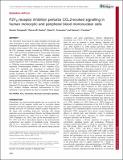Files in this item
P2Y(6) receptor inhibition perturbs CCL2-evoked signalling in human monocytic and peripheral blood mononuclear cells
Item metadata
| dc.contributor.author | Campwala, Hinnah | |
| dc.contributor.author | Sexton, Darren W. | |
| dc.contributor.author | Crossman, David C. | |
| dc.contributor.author | Fountain, Samuel J. | |
| dc.date.accessioned | 2015-08-07T15:40:01Z | |
| dc.date.available | 2015-08-07T15:40:01Z | |
| dc.date.issued | 2014-11-15 | |
| dc.identifier | 207745028 | |
| dc.identifier | 22748841-7c6d-4064-88a1-ff9ca6227b0d | |
| dc.identifier | 000354415700012 | |
| dc.identifier | 84911981779 | |
| dc.identifier.citation | Campwala , H , Sexton , D W , Crossman , D C & Fountain , S J 2014 , ' P2Y(6) receptor inhibition perturbs CCL2-evoked signalling in human monocytic and peripheral blood mononuclear cells ' , Journal of Cell Science , vol. 127 , no. 22 , pp. 4964-4973 . https://doi.org/10.1242/jcs.159012 | en |
| dc.identifier.issn | 0021-9533 | |
| dc.identifier.other | ORCID: /0000-0003-4762-8623/work/60196619 | |
| dc.identifier.uri | https://hdl.handle.net/10023/7154 | |
| dc.description | This work is supported the British Heart Foundation [grant number PG/13/22/ 30077]. Deposited in PMC for immediate release. | en |
| dc.description.abstract | The chemokine CCL2 serves to target circulating monocytes and other leukocytes to tissue during innate immune responses, and modulates the progression of chronic inflammatory disease through activation of the receptor CCR2. Here, we show that co-activation of the P2Y(6) purinergic receptor (encoded by P2RY6) occurs when THP-1 cells and human peripheral blood mononuclear cells sense CCL2 through CCR2. Furthermore, P2Y(6) receptor activation accounts for similar to 80% of the intracellular Ca2+ signal evoked by CCL2. Scavenging extracellular nucleotides with apyrase caused a fourfold reduction in THP-1 sensitivity to CCL2, whereas inhibition of CD39-like ectonucleotidases potentiated CCL2-evoked Ca2+ responses. Pharmacological inhibition of P2Y(6) impaired CCL2-evoked Ca2+ signalling and chemotaxis in peripheral blood mononuclear cells and THP-1 cells. Furthermore, stable P2Y(6) receptor knockdown (of twofold) in THP-1 cells impaired CCL2-evoked Ca2+ signalling, chemotaxis and adhesion to TNF alpha-treated HUVECs. We demonstrate that THP-1 cells rapidly secrete ATP during signalling downstream of the CCL2-CCR2 axis and suggest this might act as a mechanism for P2Y(6) receptor co-activation following CCL2 activation of the CCR2 receptor. The discovery that P2Y(6) receptor mediates leukocyte responsiveness to CCL2 represents a new mechanism by which to modulate CCL2 signals. | |
| dc.format.extent | 10 | |
| dc.format.extent | 1163121 | |
| dc.language.iso | eng | |
| dc.relation.ispartof | Journal of Cell Science | en |
| dc.subject | P2Y(6) | en |
| dc.subject | Chemokine | en |
| dc.subject | Monocyte | en |
| dc.subject | Purinergic signalling | en |
| dc.subject | R Medicine | en |
| dc.subject | SDG 3 - Good Health and Well-being | en |
| dc.subject.lcc | R | en |
| dc.title | P2Y(6) receptor inhibition perturbs CCL2-evoked signalling in human monocytic and peripheral blood mononuclear cells | en |
| dc.type | Journal article | en |
| dc.contributor.institution | University of St Andrews. School of Medicine | en |
| dc.contributor.institution | University of St Andrews. Office of the Principal | en |
| dc.identifier.doi | https://doi.org/10.1242/jcs.159012 | |
| dc.description.status | Peer reviewed | en |
This item appears in the following Collection(s)
Items in the St Andrews Research Repository are protected by copyright, with all rights reserved, unless otherwise indicated.

